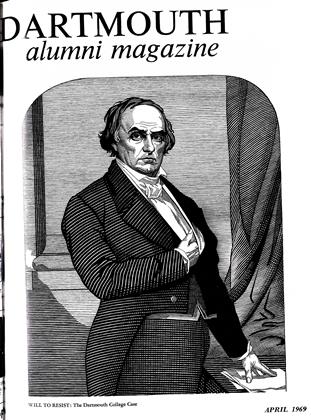SANBORN English House, whose genteel ambience provides an antidote to the harsh realities of "confrontation politics," recently was the scene of a memorable Sherry Hour.
A bronze statue, given in .memory of Prof. Walter Brooks Drayton Henderson, a member of the English Department from 1925 until his death in 1939, was formally accepted. It had been presented by the sculptress, Miss Hazel Brill Jackson of Newburgh, N. Y.
Friends of Miss Jackson and the late Professor Henderson attended the reception. Prof. Henry L. Terrie Jr., Chairman of the English Department, read a tribute to Professor Henderson, who was a descendant of the seventeenth-century poet Michael Drayton.
Miss Jackson's sculpture, a bronze figure of a knight on horseback, was inspired by a line from Professor Henderson's epic poem, The New Argonautica, written in 1928.
Since Professor Henderson was especially noted for his lectures on Shakespeare, the statue was appropriately placed in the Shakespeare Room of Sanborn House.
DEAN John W. Hennessey Jr. of the Tuck School in late March traveled to Robert College in Istanbul, Turkey, to serve as consultant on curriculum planning for its School of Business Administration.
His visit was one of recurring contacts between Dartmouth and Robert College, the oldest western institution of higher learning in the Middle East. President John S. Everton visited Hanover last summer and in 1967 the dean of the business school spent several days at Tuck. Another tie is provided by Donald S. Hoffman Jr. '53, a musicologist, who is on the faculty. Mehmet Emin Arda '69, a native of Istanbul who attended Robert Academy, hopes to return to Turkey as a college teacher.
Robert College, a private university complex founded in 1863 with the aid of funds and personnel from the United States, has a prep school, an arts and sciences college, and several graduate professional schools
AUGUSTUS E. DEMAGGIO, Associate Professor of Biological Sciences, has been elected a Fellow of the American Association for the Advancement of Science. He was cited for his "research contributions" in the field of biology. Since coming to the College in 1964 he has taught undergraduate and graduate courses in biology. He is currently doing research on the control of plant growth and development under a grant from the National Science Foundation.
Professor DeMaggio recently participated in symposia at the University of Vermont and Ohio State University. He has also recently presented research papers at seminars and given invitational lectures at Harvard University, Ohio State University, the University of Oregon, and the University of California at Berkeley. During the winter term he continued his research at the biological laboratories at Harvard University, where he was a visiting professor in the laboratories of Prof. Laury Bogorad, noted plant physiologist and cell biologist.
JAY EVANS '49, Assistant Director of Admissions, has been selected by the National Slalom Committee of the American Canoe Association to be trainercoach of the U.S. white-water team that will compete in the World Canoe Championships in France this summer. ... Prof. Harry N. Scheiber of the History Department has been named to the board of directors of the New Hampshire Civil Liberties Union. ... Serving as Visiting Lecturer in Public Policy at the Tuck School during the spring term will be Gerald S. Witherspoon who recently completed a four-year term as Commissioner of Taxes in Vermont. ... Prof. Thomas H. Vance of the English Department and his wife Vera have contributed English versions of 13 modern Norwegian poems to the winter issue of The Literary Review.
JAMES F. CUSICK, Professor of Economics Emeritus, has been named adviser to Dartmouth undergraduates on Selective Service and other military programs, as well as on the laws on draft deferment. He will be available to counsel seniors and other undergraduates during regular office hours and will also see students by appointment. In order to be up to date on the various military programs and the many laws and regulations pertaining to them, he will be in regular communication with the military services and Selective Service. He will also maintain continuing liaison with advisers in other colleges and universities to provide Dartmouth seniors with as much information as possible as they endeavor to plan their future career directions.
Professor Cusick retired in 1964 after 30 years on the Dartmouth faculty, but has since been active as a faculty member of Alumni College and as a participant in Hanover community affairs.
PROF. CHARLES T. WOOD of the History Department gave a paper entitled "The Investiture Conflict and the Re-emergence of Public Authority" at Johns Hopkins University in early February. At the New England regional meeting of the Conference of British Studies at the University of Connecticut in late April he will present another paper, "Personality and Constitutional Crisis: The Question of Edward II."
 View Full Issue
View Full Issue
More From This Issue
-
 Feature
FeatureWILL TO RESIST
April 1969 By RICHARD W. MORIN '24 -
 Feature
FeatureThe New Dean of the College...
April 1969 -
 Feature
FeatureCongress Authorizes National Medal
April 1969 -
 Class Notes
Class Notes1933
April 1969 By ERNEST S. DAVIS JR., WESLEY H. BEATTIE -
 Class Notes
Class Notes1930
April 1969 By CHARLES V. RAYMOND, G. WARREN FRENCH -
 Class Notes
Class Notes1955
April 1969 By JOSEPH D. MATHEWSON, RANDOLPH J. HAYES
WILLIAM R. MEYER
-
 Article
ArticleThe Faculty
FEBRUARY 1968 By WILLIAM R. MEYER -
 Article
ArticleThe Faculty
MARCH 1968 By WILLIAM R. MEYER -
 Article
ArticleThe Faculty
JUNE 1968 By WILLIAM R. MEYER -
 Article
ArticleThe Faculty
OCTOBER 1969 By WILLIAM R. MEYER -
 Article
ArticleThe Faculty
JANUARY 1970 By WILLIAM R. MEYER -
 Article
ArticleThe Faculty
FEBRUARY 1970 By WILLIAM R. MEYER
Article
-
 Article
ArticleGeorgia Game Plans
November 1941 -
 Article
ArticleDouble Editor
April 1951 -
 Article
ArticleMorrissey Scholarship Fund
JANUARY/FEBRUARY 1983 -
 Article
ArticleWestern Conference
November 1950 By C. E. W. -
 Article
ArticleViet Nam: The Greater Tyranny
OCTOBER 1965 By JOHN LAMPERTI -
 Article
ArticleAlumni News
Nov/Dec 2004 By Katherine Taylor '97

